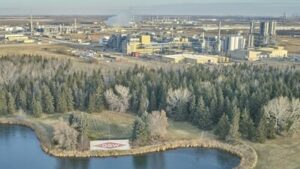Dow to build the world’s first net zero emissions ethylene cracker in Alberta
Midland, MI – Dow announced that its board of directors has declared Final Investment Decision on the Company’s Fort Saskatchewan Path2Zero investment to build the world’s first net-zero Scope 1 and 2 emissions integrated ethylene cracker and derivatives facility in Alberta, Canada.
The $6.5 billion project, excluding governmental incentives and subsidies, includes building a new ethylene cracker and increasing polyethylene capacity by 2 million MTA as well as retrofitting the site’s existing cracker to net-zero Scope 1 and 2 emissions. The investment is expected to deliver $1 billion of EBITDA growth per year at full run rates over the economic cycle while decarbonizing 20% of Dow’s global ethylene capacity.
This new capacity will enable Dow to capture growing customer demand in high-value markets, such as packaging, infrastructure and hygiene, among others, with potential additional value captured from commercializing low and zero-emissions products. The project builds on Dow’s expertise in successfully implementing large projects, such as its TX-9 cracker in Freeport, Texas, which has delivered more than 15% return on invested capital since its 2017 start-up through best-in-class capital intensity, conversion cost, and low emissions intensity.
The board’s approval enables the Company to begin construction in 2024. Capacity additions are expected to come online in phases, with the first phase starting up in 2027, adding approximately 1,285 KTAiv of ethylene and polyethylene capacity, and the second phase starting up in 2029, adding an additional approximately 600 KTA of capacity.
To achieve net-zero Scope 1 and 2 emissions, the Fort Saskatchewan Path2Zero project will deploy Linde’s air separation and autothermal reformer technology to convert the site’s cracker off-gas to hydrogen, which will be used as a clean fuel to supply the site’s furnaces. In addition, carbon dioxide emissions will be captured and stored, reducing existing emissions by approximately 1 million MTA of CO2e while abating all emissions from the addition of the site’s new capacity.
The Canadian and Alberta Advantage
Dow selected the Fort Saskatchewan site for this investment as Western Canada offers highly cost-competitive natural gas relative to other regions, as well as cost-advantaged ethane, a key feedstock for ethylene production. At full run-rates, the site is expected to be one of Dow’s most cost-competitive in the world. The region also features access to existing CO2 transportation and storage infrastructure with available capacity to fully support decarbonization of the project. It is home to a high-class workforce and Dow has been part of the community for more than 60 years.
Additionally, the governments of Canada, Alberta, and Fort Saskatchewan have made subsidies and incentives available to support this project and to drive innovation in low-emissions manufacturing in Canada. It will be the first project to access Canada’s new ITC program.
Dow’s investment leverages approximately $2 billion of investment from third-party companies for circular hydrogen, CO2 capture, and other infrastructure assets critical to the project execution. Earlier this year, Dow announced that Linde had been selected as its industrial gas partner for the supply of clean hydrogen and nitrogen for the site, and Fluor was selected for front-end engineering and design. Additionally, Dow is partnering with Wolf Midstream, which will provide CO2 transportation along the Alberta trunk line, and with Ravago which will provide third-party logistics for finished products from the site.

